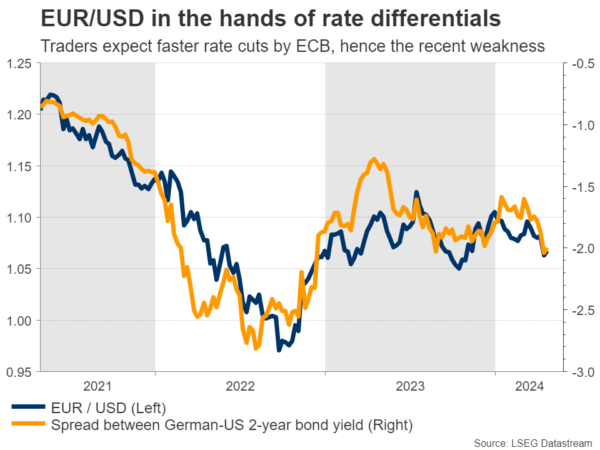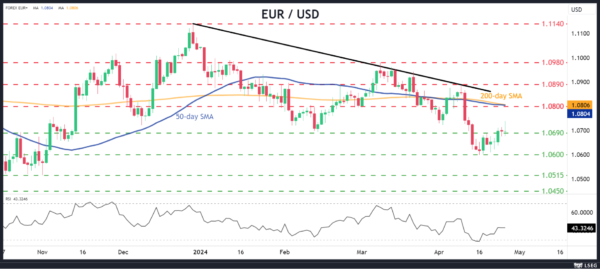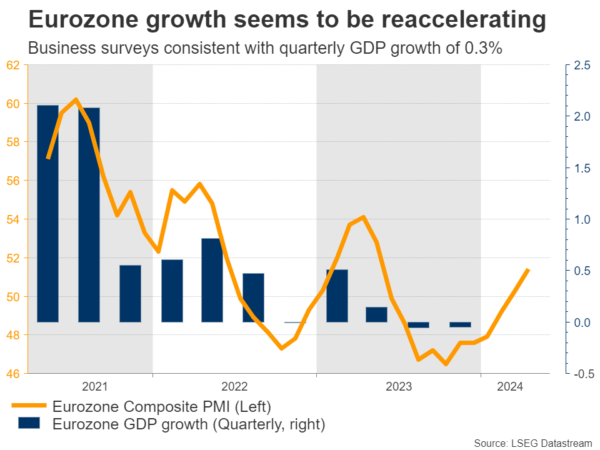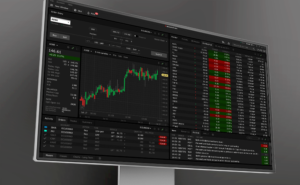- Euro loses ground as European Central Bank signals rate cuts
- But only against US dollar – holds strong against pound and yen
- Eurozone GDP and inflation stats on Tuesday will decide what’s next
Imminent rate cuts bruise euro
It’s been a difficult year for the euro, which has already declined 3% against the dollar as the economic divergence between the Eurozone and the United States has convinced investors the ECB is set to cut interest rates faster and deeper than the Fed.
Economic growth in the euro area has been stagnant for about a year now and inflation has cooled rapidly, falling to just 2.4% in March. As such, ECB officials have made it abundantly clear they intend to slash rates in June, so that looks almost like a done deal. The real question is how they will proceed afterwards.

In this sense, some leading indicators have flashed encouraging signals lately, with business surveys pointing to a reacceleration in growth and inflationary pressures. If that is reflected in official data soon, the ECB might decide to ‘play it slow’ with any subsequent rate cuts beyond June.
GDP and inflation data on the radar
Next week, the spotlight will fall on the first estimate of Eurozone GDP growth for Q1 and inflation stats for April, both due on Tuesday. The unemployment rate for March will follow on Friday.
Business surveys were consistent with GDP expanding by 0.3% in the first quarter compared to the preceding quarter, when growth was flat. The same surveys warned that inflation fired up again in April as companies raised their selling prices at a faster clip, reflecting rising wage and energy costs.
A reacceleration in both growth and inflation could throw the euro a much-needed lifeline, bolstering the single currency through the interest rate channel as traders unwind some bets of rapid ECB rate cuts.

Looking at the euro/dollar chart, the pair has been trading below a downtrend line this year with a clear structure of lower highs and lower lows, which keeps the prevailing trend negative.
That said, a strong batch of data could allow the latest recovery to continue, perhaps towards 1.0800, a region reinforced by the 50- and 200-day simple moving averages (SMAs).
On the downside, a disappointment in the upcoming data can bring the pair under renewed selling interest. A potential drop back below the 1.0690 zone would shift the focus towards the April lows near 1.0600.
Euro outlook
In the bigger picture, the euro’s losses this year have been concentrated mostly against the mighty US dollar. Against the British pound, the single currency has only lost 1%, while it has risen almost 7% against the sinking Japanese yen.

Judging by economic performance, these patterns can persist. The US economy is the strongest in terms of growth, so the dollar may continue to outperform in the foreseeable future, especially if stock markets remain shaky. The Eurozone and UK economies are in similar shape, which suggests those two currencies could continue to trade almost in lockstep.
Hence, the euro’s best chance at further gains may be against the yield-starved Japanese yen. In this sense, the main risk is the prospect of FX intervention by Tokyo. That said, the yen might need to fall even further before authorities step in.









